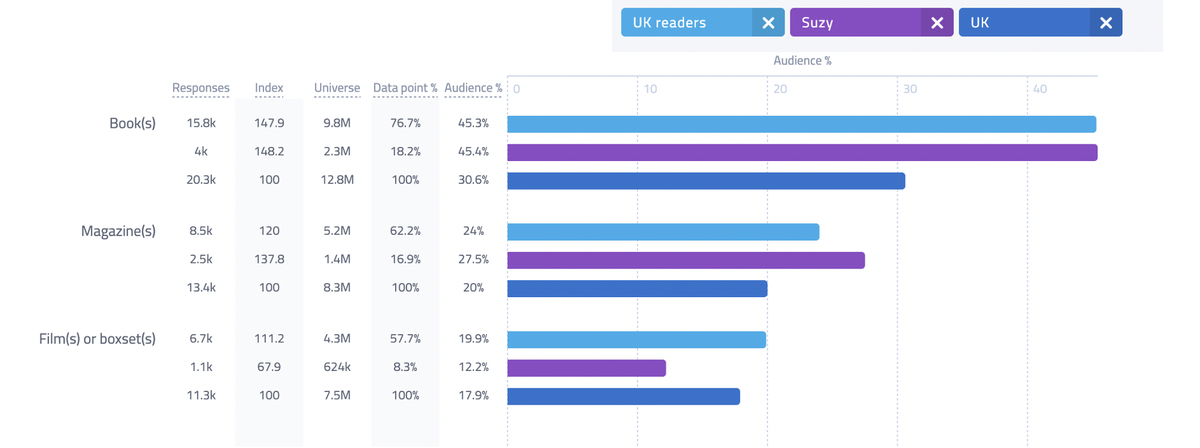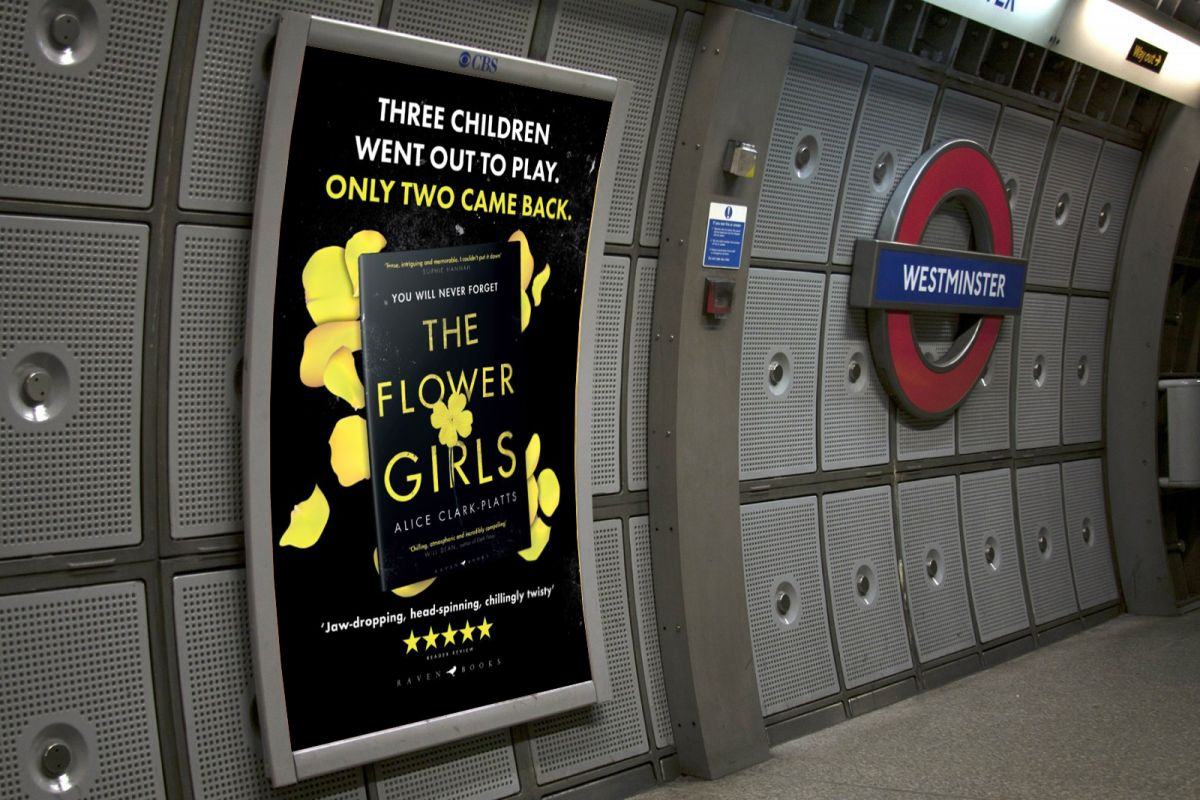It& #39;s been a while since I did a book stats thread
And since I can& #39;t stop thinking about this *awful*, racist quote from the #rethinkingdiversity report
I& #39;ve spent some time thinking about why publishing knows so little about who its readers are and how it reaches them.
And since I can& #39;t stop thinking about this *awful*, racist quote from the #rethinkingdiversity report
I& #39;ve spent some time thinking about why publishing knows so little about who its readers are and how it reaches them.
1. Who buys & reads books?
Book marketing in the UK rests on a few demographic assumptions about & #39;readers& #39;, which boil down to....
 https://abs.twimg.com/emoji/v2/... draggable="false" alt="📚" title="Bücher" aria-label="Emoji: Bücher"> 60% of are women
https://abs.twimg.com/emoji/v2/... draggable="false" alt="📚" title="Bücher" aria-label="Emoji: Bücher"> 60% of are women
 https://abs.twimg.com/emoji/v2/... draggable="false" alt="📚" title="Bücher" aria-label="Emoji: Bücher"> 45% are aged 45 or over
https://abs.twimg.com/emoji/v2/... draggable="false" alt="📚" title="Bücher" aria-label="Emoji: Bücher"> 45% are aged 45 or over
 https://abs.twimg.com/emoji/v2/... draggable="false" alt="📚" title="Bücher" aria-label="Emoji: Bücher"> 66% are middle to high income
https://abs.twimg.com/emoji/v2/... draggable="false" alt="📚" title="Bücher" aria-label="Emoji: Bücher"> 66% are middle to high income
 https://abs.twimg.com/emoji/v2/... draggable="false" alt="📚" title="Bücher" aria-label="Emoji: Bücher"> And an untested assumption that most of them are white
https://abs.twimg.com/emoji/v2/... draggable="false" alt="📚" title="Bücher" aria-label="Emoji: Bücher"> And an untested assumption that most of them are white
Book marketing in the UK rests on a few demographic assumptions about & #39;readers& #39;, which boil down to....
2. The creation of Suzie
Each of these assumptions may or may not be true on their own. But many publishers throw them together to create an imagined core audience - the Suzie - who they assume is the ultimate book buyer.
https://www.spreadtheword.org.uk/wp-content/uploads/2020/06/Rethinking_diversity_in-publishing_WEB.pdf">https://www.spreadtheword.org.uk/wp-conten...
Each of these assumptions may or may not be true on their own. But many publishers throw them together to create an imagined core audience - the Suzie - who they assume is the ultimate book buyer.
https://www.spreadtheword.org.uk/wp-content/uploads/2020/06/Rethinking_diversity_in-publishing_WEB.pdf">https://www.spreadtheword.org.uk/wp-conten...
3. But Suzie is a segment of an audience, not an audience
 https://abs.twimg.com/emoji/v2/... draggable="false" alt="📚" title="Bücher" aria-label="Emoji: Bücher">There are 21.4 million people in the UK who self-identify as & #39;readers& #39; according to my database (GWI)
https://abs.twimg.com/emoji/v2/... draggable="false" alt="📚" title="Bücher" aria-label="Emoji: Bücher">There are 21.4 million people in the UK who self-identify as & #39;readers& #39; according to my database (GWI)
 https://abs.twimg.com/emoji/v2/... draggable="false" alt="📚" title="Bücher" aria-label="Emoji: Bücher">Only 5 million of these readers are white women aged 45+
https://abs.twimg.com/emoji/v2/... draggable="false" alt="📚" title="Bücher" aria-label="Emoji: Bücher">Only 5 million of these readers are white women aged 45+
So Suzie represents less than a quarter of UK readers
So Suzie represents less than a quarter of UK readers
4. And Suzie doesn& #39;t have to be white
I can add half a million extra consumers to the Suzie audience segment - that& #39;s 500,000 potential book buyers - just by assuming that Suzie doesn& #39;t have to be white
I can add half a million extra consumers to the Suzie audience segment - that& #39;s 500,000 potential book buyers - just by assuming that Suzie doesn& #39;t have to be white
5. A note on Suzie& #39;s assumed racism
One of the most distressing things about the #rethinkingdiversity report was the groupthink it demonstrated about diversity.
There was this idea that in order to attract, Suzie publishers had to pander to her assumptions.
One of the most distressing things about the #rethinkingdiversity report was the groupthink it demonstrated about diversity.
There was this idea that in order to attract, Suzie publishers had to pander to her assumptions.
6. Suzie is more open-minded than you think
When I looked at the social attitudes of this audience I saw something different. I saw an interest in different cultures, lifestyles and experiences and a willingness to address issues like inequality.
When I looked at the social attitudes of this audience I saw something different. I saw an interest in different cultures, lifestyles and experiences and a willingness to address issues like inequality.
7. If Suzie is *the* book buyer, why doesn& #39;t book marketing work better?
The weird thing about UK publishing is that it& #39;s tied itself in knots to appeal to an audience that it can& #39;t
 https://abs.twimg.com/emoji/v2/... draggable="false" alt="🔍" title="Nach links zeigende Lupe" aria-label="Emoji: Nach links zeigende Lupe"> quantify
https://abs.twimg.com/emoji/v2/... draggable="false" alt="🔍" title="Nach links zeigende Lupe" aria-label="Emoji: Nach links zeigende Lupe"> quantify
 https://abs.twimg.com/emoji/v2/... draggable="false" alt="🤔" title="Denkendes Gesicht" aria-label="Emoji: Denkendes Gesicht"> understand
https://abs.twimg.com/emoji/v2/... draggable="false" alt="🤔" title="Denkendes Gesicht" aria-label="Emoji: Denkendes Gesicht"> understand
 https://abs.twimg.com/emoji/v2/... draggable="false" alt="🤯" title="Explodierender Kopf" aria-label="Emoji: Explodierender Kopf"> or influence
https://abs.twimg.com/emoji/v2/... draggable="false" alt="🤯" title="Explodierender Kopf" aria-label="Emoji: Explodierender Kopf"> or influence
(only 12.7% researched their last book purchase)
The weird thing about UK publishing is that it& #39;s tied itself in knots to appeal to an audience that it can& #39;t
(only 12.7% researched their last book purchase)
8. Spoiler, the marketing doesn& #39;t work
Because even though publishers lavish everything they have on keeping their imagined Suzies happy....
Suzie is only 0.1% more likely than the average reader to have bought a book in the last month.
Because even though publishers lavish everything they have on keeping their imagined Suzies happy....
Suzie is only 0.1% more likely than the average reader to have bought a book in the last month.
9. It doesn& #39;t work because Suzie doesn& #39;t see it
80% of Suzies live in a suburban or rural setting, and only 30% of works full-time. They& #39;re not commuters.
So it& #39;s doubtful they& #39;d see the outdoor campaigns that publishers use to signify a & #39;buzzy& #39; book.
80% of Suzies live in a suburban or rural setting, and only 30% of works full-time. They& #39;re not commuters.
So it& #39;s doubtful they& #39;d see the outdoor campaigns that publishers use to signify a & #39;buzzy& #39; book.
10. It doesn& #39;t work because publishers can& #39;t secure it
Even though 20% of Suzies learn about new products like books from articles in the media (which is high), securing that coverage is hard.
200k books were published in the UK in 2019. Those are long odds for a review.
Even though 20% of Suzies learn about new products like books from articles in the media (which is high), securing that coverage is hard.
200k books were published in the UK in 2019. Those are long odds for a review.
11. It doesn& #39;t work because it targets the wrong audience in the wrong channels
I could write several long articles about selling books through social media. But sadly Suzie doesn& #39;t use it much, so she& #39;ll never see your Twitter giveaway.
I could write several long articles about selling books through social media. But sadly Suzie doesn& #39;t use it much, so she& #39;ll never see your Twitter giveaway.
12. So what *does* work?
If we do assume that Suzie is THE ONE, a few more effective ways to reach her are:
 https://abs.twimg.com/emoji/v2/... draggable="false" alt="🛍️" title="Einkaufstaschen" aria-label="Emoji: Einkaufstaschen">In-store promo (reaches 32% of audience)
https://abs.twimg.com/emoji/v2/... draggable="false" alt="🛍️" title="Einkaufstaschen" aria-label="Emoji: Einkaufstaschen">In-store promo (reaches 32% of audience)
 https://abs.twimg.com/emoji/v2/... draggable="false" alt="📧" title="E-Mail Symbol" aria-label="Emoji: E-Mail Symbol">email newsletters (reaches 24% of audience)
https://abs.twimg.com/emoji/v2/... draggable="false" alt="📧" title="E-Mail Symbol" aria-label="Emoji: E-Mail Symbol">email newsletters (reaches 24% of audience)
 https://abs.twimg.com/emoji/v2/... draggable="false" alt="🕸️" title="Spinnennetz" aria-label="Emoji: Spinnennetz">SEO (reaches 48% of audience & more effective than tv advertising)
https://abs.twimg.com/emoji/v2/... draggable="false" alt="🕸️" title="Spinnennetz" aria-label="Emoji: Spinnennetz">SEO (reaches 48% of audience & more effective than tv advertising)
If we do assume that Suzie is THE ONE, a few more effective ways to reach her are:
13. But marketing does not come for free
Truly effective marketing is a matter of:
Insight - taking the time to understand your customer
Investment - investing in the best ways to reach them
Effort - doing it again & again till it works
Truly effective marketing is a matter of:
Insight - taking the time to understand your customer
Investment - investing in the best ways to reach them
Effort - doing it again & again till it works
14. The cheapness of publishing will be the death of books
In publishing there& #39;s a prevailing idea that the best marketing comes for free. Success is about word of mouth & virality
But that& #39;s the marketing equivalent of going into a casino & putting all your chips on black
In publishing there& #39;s a prevailing idea that the best marketing comes for free. Success is about word of mouth & virality
But that& #39;s the marketing equivalent of going into a casino & putting all your chips on black
15. So where do we go from here?
I say this time & again but even though I love books, publishing itself is built on rickety assumptions that:
 https://abs.twimg.com/emoji/v2/... draggable="false" alt="📚" title="Bücher" aria-label="Emoji: Bücher">have nothing to do with readers
https://abs.twimg.com/emoji/v2/... draggable="false" alt="📚" title="Bücher" aria-label="Emoji: Bücher">have nothing to do with readers
 https://abs.twimg.com/emoji/v2/... draggable="false" alt="📚" title="Bücher" aria-label="Emoji: Bücher">everything to do with propping up an increasingly unsustainable status quo
https://abs.twimg.com/emoji/v2/... draggable="false" alt="📚" title="Bücher" aria-label="Emoji: Bücher">everything to do with propping up an increasingly unsustainable status quo
Something has to give.
I say this time & again but even though I love books, publishing itself is built on rickety assumptions that:
Something has to give.

 Read on Twitter
Read on Twitter
 60% of are womenhttps://abs.twimg.com/emoji/v2/... draggable="false" alt="📚" title="Bücher" aria-label="Emoji: Bücher"> 45% are aged 45 or overhttps://abs.twimg.com/emoji/v2/... draggable="false" alt="📚" title="Bücher" aria-label="Emoji: Bücher"> 66% are middle to high incomehttps://abs.twimg.com/emoji/v2/... draggable="false" alt="📚" title="Bücher" aria-label="Emoji: Bücher"> And an untested assumption that most of them are white" title="1. Who buys & reads books?Book marketing in the UK rests on a few demographic assumptions about & #39;readers& #39;, which boil down to....https://abs.twimg.com/emoji/v2/... draggable="false" alt="📚" title="Bücher" aria-label="Emoji: Bücher"> 60% of are womenhttps://abs.twimg.com/emoji/v2/... draggable="false" alt="📚" title="Bücher" aria-label="Emoji: Bücher"> 45% are aged 45 or overhttps://abs.twimg.com/emoji/v2/... draggable="false" alt="📚" title="Bücher" aria-label="Emoji: Bücher"> 66% are middle to high incomehttps://abs.twimg.com/emoji/v2/... draggable="false" alt="📚" title="Bücher" aria-label="Emoji: Bücher"> And an untested assumption that most of them are white">
60% of are womenhttps://abs.twimg.com/emoji/v2/... draggable="false" alt="📚" title="Bücher" aria-label="Emoji: Bücher"> 45% are aged 45 or overhttps://abs.twimg.com/emoji/v2/... draggable="false" alt="📚" title="Bücher" aria-label="Emoji: Bücher"> 66% are middle to high incomehttps://abs.twimg.com/emoji/v2/... draggable="false" alt="📚" title="Bücher" aria-label="Emoji: Bücher"> And an untested assumption that most of them are white" title="1. Who buys & reads books?Book marketing in the UK rests on a few demographic assumptions about & #39;readers& #39;, which boil down to....https://abs.twimg.com/emoji/v2/... draggable="false" alt="📚" title="Bücher" aria-label="Emoji: Bücher"> 60% of are womenhttps://abs.twimg.com/emoji/v2/... draggable="false" alt="📚" title="Bücher" aria-label="Emoji: Bücher"> 45% are aged 45 or overhttps://abs.twimg.com/emoji/v2/... draggable="false" alt="📚" title="Bücher" aria-label="Emoji: Bücher"> 66% are middle to high incomehttps://abs.twimg.com/emoji/v2/... draggable="false" alt="📚" title="Bücher" aria-label="Emoji: Bücher"> And an untested assumption that most of them are white">
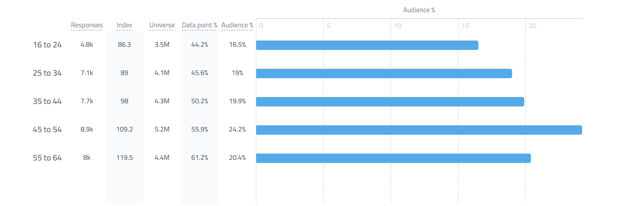 60% of are womenhttps://abs.twimg.com/emoji/v2/... draggable="false" alt="📚" title="Bücher" aria-label="Emoji: Bücher"> 45% are aged 45 or overhttps://abs.twimg.com/emoji/v2/... draggable="false" alt="📚" title="Bücher" aria-label="Emoji: Bücher"> 66% are middle to high incomehttps://abs.twimg.com/emoji/v2/... draggable="false" alt="📚" title="Bücher" aria-label="Emoji: Bücher"> And an untested assumption that most of them are white" title="1. Who buys & reads books?Book marketing in the UK rests on a few demographic assumptions about & #39;readers& #39;, which boil down to....https://abs.twimg.com/emoji/v2/... draggable="false" alt="📚" title="Bücher" aria-label="Emoji: Bücher"> 60% of are womenhttps://abs.twimg.com/emoji/v2/... draggable="false" alt="📚" title="Bücher" aria-label="Emoji: Bücher"> 45% are aged 45 or overhttps://abs.twimg.com/emoji/v2/... draggable="false" alt="📚" title="Bücher" aria-label="Emoji: Bücher"> 66% are middle to high incomehttps://abs.twimg.com/emoji/v2/... draggable="false" alt="📚" title="Bücher" aria-label="Emoji: Bücher"> And an untested assumption that most of them are white">
60% of are womenhttps://abs.twimg.com/emoji/v2/... draggable="false" alt="📚" title="Bücher" aria-label="Emoji: Bücher"> 45% are aged 45 or overhttps://abs.twimg.com/emoji/v2/... draggable="false" alt="📚" title="Bücher" aria-label="Emoji: Bücher"> 66% are middle to high incomehttps://abs.twimg.com/emoji/v2/... draggable="false" alt="📚" title="Bücher" aria-label="Emoji: Bücher"> And an untested assumption that most of them are white" title="1. Who buys & reads books?Book marketing in the UK rests on a few demographic assumptions about & #39;readers& #39;, which boil down to....https://abs.twimg.com/emoji/v2/... draggable="false" alt="📚" title="Bücher" aria-label="Emoji: Bücher"> 60% of are womenhttps://abs.twimg.com/emoji/v2/... draggable="false" alt="📚" title="Bücher" aria-label="Emoji: Bücher"> 45% are aged 45 or overhttps://abs.twimg.com/emoji/v2/... draggable="false" alt="📚" title="Bücher" aria-label="Emoji: Bücher"> 66% are middle to high incomehttps://abs.twimg.com/emoji/v2/... draggable="false" alt="📚" title="Bücher" aria-label="Emoji: Bücher"> And an untested assumption that most of them are white">
 60% of are womenhttps://abs.twimg.com/emoji/v2/... draggable="false" alt="📚" title="Bücher" aria-label="Emoji: Bücher"> 45% are aged 45 or overhttps://abs.twimg.com/emoji/v2/... draggable="false" alt="📚" title="Bücher" aria-label="Emoji: Bücher"> 66% are middle to high incomehttps://abs.twimg.com/emoji/v2/... draggable="false" alt="📚" title="Bücher" aria-label="Emoji: Bücher"> And an untested assumption that most of them are white" title="1. Who buys & reads books?Book marketing in the UK rests on a few demographic assumptions about & #39;readers& #39;, which boil down to....https://abs.twimg.com/emoji/v2/... draggable="false" alt="📚" title="Bücher" aria-label="Emoji: Bücher"> 60% of are womenhttps://abs.twimg.com/emoji/v2/... draggable="false" alt="📚" title="Bücher" aria-label="Emoji: Bücher"> 45% are aged 45 or overhttps://abs.twimg.com/emoji/v2/... draggable="false" alt="📚" title="Bücher" aria-label="Emoji: Bücher"> 66% are middle to high incomehttps://abs.twimg.com/emoji/v2/... draggable="false" alt="📚" title="Bücher" aria-label="Emoji: Bücher"> And an untested assumption that most of them are white">
60% of are womenhttps://abs.twimg.com/emoji/v2/... draggable="false" alt="📚" title="Bücher" aria-label="Emoji: Bücher"> 45% are aged 45 or overhttps://abs.twimg.com/emoji/v2/... draggable="false" alt="📚" title="Bücher" aria-label="Emoji: Bücher"> 66% are middle to high incomehttps://abs.twimg.com/emoji/v2/... draggable="false" alt="📚" title="Bücher" aria-label="Emoji: Bücher"> And an untested assumption that most of them are white" title="1. Who buys & reads books?Book marketing in the UK rests on a few demographic assumptions about & #39;readers& #39;, which boil down to....https://abs.twimg.com/emoji/v2/... draggable="false" alt="📚" title="Bücher" aria-label="Emoji: Bücher"> 60% of are womenhttps://abs.twimg.com/emoji/v2/... draggable="false" alt="📚" title="Bücher" aria-label="Emoji: Bücher"> 45% are aged 45 or overhttps://abs.twimg.com/emoji/v2/... draggable="false" alt="📚" title="Bücher" aria-label="Emoji: Bücher"> 66% are middle to high incomehttps://abs.twimg.com/emoji/v2/... draggable="false" alt="📚" title="Bücher" aria-label="Emoji: Bücher"> And an untested assumption that most of them are white">
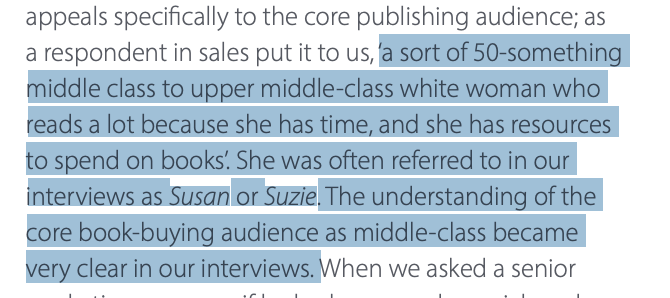

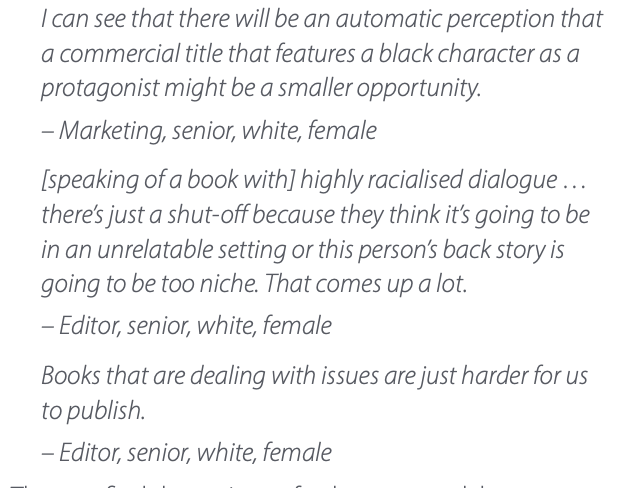

 quantifyhttps://abs.twimg.com/emoji/v2/... draggable="false" alt="🤔" title="Denkendes Gesicht" aria-label="Emoji: Denkendes Gesicht"> understandhttps://abs.twimg.com/emoji/v2/... draggable="false" alt="🤯" title="Explodierender Kopf" aria-label="Emoji: Explodierender Kopf"> or influence(only 12.7% researched their last book purchase)" title="7. If Suzie is *the* book buyer, why doesn& #39;t book marketing work better?The weird thing about UK publishing is that it& #39;s tied itself in knots to appeal to an audience that it can& #39;thttps://abs.twimg.com/emoji/v2/... draggable="false" alt="🔍" title="Nach links zeigende Lupe" aria-label="Emoji: Nach links zeigende Lupe"> quantifyhttps://abs.twimg.com/emoji/v2/... draggable="false" alt="🤔" title="Denkendes Gesicht" aria-label="Emoji: Denkendes Gesicht"> understandhttps://abs.twimg.com/emoji/v2/... draggable="false" alt="🤯" title="Explodierender Kopf" aria-label="Emoji: Explodierender Kopf"> or influence(only 12.7% researched their last book purchase)" class="img-responsive" style="max-width:100%;"/>
quantifyhttps://abs.twimg.com/emoji/v2/... draggable="false" alt="🤔" title="Denkendes Gesicht" aria-label="Emoji: Denkendes Gesicht"> understandhttps://abs.twimg.com/emoji/v2/... draggable="false" alt="🤯" title="Explodierender Kopf" aria-label="Emoji: Explodierender Kopf"> or influence(only 12.7% researched their last book purchase)" title="7. If Suzie is *the* book buyer, why doesn& #39;t book marketing work better?The weird thing about UK publishing is that it& #39;s tied itself in knots to appeal to an audience that it can& #39;thttps://abs.twimg.com/emoji/v2/... draggable="false" alt="🔍" title="Nach links zeigende Lupe" aria-label="Emoji: Nach links zeigende Lupe"> quantifyhttps://abs.twimg.com/emoji/v2/... draggable="false" alt="🤔" title="Denkendes Gesicht" aria-label="Emoji: Denkendes Gesicht"> understandhttps://abs.twimg.com/emoji/v2/... draggable="false" alt="🤯" title="Explodierender Kopf" aria-label="Emoji: Explodierender Kopf"> or influence(only 12.7% researched their last book purchase)" class="img-responsive" style="max-width:100%;"/>
